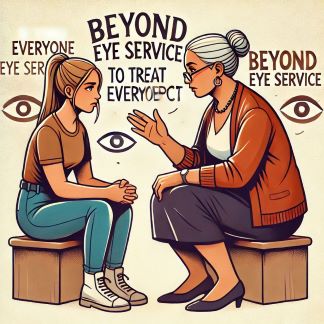Beyond Eye Service: When Motive Matters
“Eye Service” – a superficial display of affection or respect, devoid of genuine emotion.
This toxic behaviour inflicts a serious wound on our collective humanity, revealing our inability to love and regard others with sincerity.
Many people have a tendency to show respect and care only to those they believe will benefit them while disregarding others they consider “ordinary.”
This behaviour is often referred to as “eye service,” which reveals a lot about our motivations as humans.
When we show care and do good deeds for others, is it genuine kindness or self-serving calculation?
It is saddening to see how many don’t genuinely care about others; instead, they show affection only when it’s beneficial to them.
As soon as the other person can no longer provide what they need, they begin to distance themselves, seeking new connections to exploit.
Beyond Eye Service: When Motive Matters

I’d like to illustrate this point with the story of my friend Marcus.
His experience offers a valuable lesson on the importance of showing genuine care and compassion to others, even when there’s nothing in it for us.
Marcus’ life took a drastic turn when he was just 7 years old.
His father abandoned their home, leaving his mother to care for him and his younger brother alone.
It seemed Marcus’ mother had been preparing for this moment, having wisely secured a job before her husband’s departure.
This foresight proved to be a lifeline, mitigating the financial devastation that often accompanies abandonment.
With her steady income, Marcus’ mother worked tirelessly to provide for her family, determined to create a stable home despite the turmoil.
Societal expectations had long perpetuated the notion that women were destined for domesticity,
relegated to the kitchen and home while their husbands shouldered the financial burden.
But Marcus’ mother refused to be constrained by these limitations.
Although having studied Accounting Education, she could have easily succumbed to the pressure to become a full-time housewife,
surrendering her ambitions out of love, trust, and submission to her husband’s will.
Fortunately, her foresight and determination had led her to secure a government job at the state ministry of education, courtesy of her father’s influence.
She worked as a teacher, now a retiree.
Her salary was barely enough to take care of herself and her two kids on her own,
but she managed to sponsor Marcus’s education full-time from the primary level to half of his secondary level.
When the burden became so much that she consistently ended up broke, she sought help from her elder brother who lived abroad.
It was her elder brother who continued with the responsibility, sponsoring the rest of Marcus’s education till Marcus graduated from the university with his first degree.
The most intriguing aspect of Marcus’s journey was that, for a long time, he remained oblivious to the silent guardian who had played a pivotal role in his progress.
Witnessing his mother’s selfless sacrifices and struggles to provide for him and his younger brother,
led Marcus to assume that she alone had borne the weight of his educational expenses.
However, as he matured, particularly during his first year at university, his mother finally revealed to him the significant contribution of her elder brother,
who had been a steady source of support in their times of need.
“Marcus,” his mother called and sat him down,
“The comforts you enjoy today are thanks to my elder brother, Uncle Ayo,” she revealed, her voice filled with emotion.
“Never forget his kindness and always remember to pray for him, showing gratitude for all he’s done.”
Her expression turned solemn as she continued,
“Uncle Ayo stepped in when your father abandoned his responsibilities.
He’s the one who’s provided for us, putting food on our table. My salary alone couldn’t have met our needs.
Uncle Ayo has been our rock, Marcus. He’s the father figure you’ve never had. Don’t ever forget him.”
Beyond Eye Service: When Motive Matters
Marcus’s eyes widened in astonishment as he discovered the extraordinary role his uncle, affectionately known as his Godfather, had played in their lives.
He was deeply moved by Uncle Ayo’s generosity, particularly considering he had his own family to provide for.
As Marcus learned more about his uncle’s kindness, he realized that Uncle Ayo’s benevolence extended far beyond their family.
He had a reputation for selflessly supporting those in need, regardless of their relationship to him.
To Marcus, Uncle Ayo embodied the spirit of kindness and compassion, shouldering the burdens of others with humility.
From that moment on, Uncle Ayo became Marcus’s role model.
Marcus’s experiences had initially soured him on the idea of masculinity, leading him to view men as inherently irresponsible.
Having witnessed his mother’s abandonment and subsequent struggles, he had begun to see the world through a radical feminist lens.
However, Uncle Ayo’s selfless example shattered this narrative, revealing that goodness and responsibility knew no gender.
Marcus came to realize that individuals, regardless of their sex, had the capacity to choose their path.
A person’s character is not predetermined by their gender, but rather by the values and principles that guide their actions.
To foster greater understanding and empathy,
we must amplify the stories of individuals from both genders who are making a positive impact on their families and communities.
By sharing these narratives more,
we can counterbalance the negative stereotypes that often fuel gender wars, resentment, and, sweeping generalizations about entire genders.
Marcus’s gratitude for his uncle’s consistent support overflowed into a deep-seated appreciation.
He made it a point to shower his uncle with heartfelt goodwill messages on every special occasion:
New Year’s, Easter, Christmas, and, of course, his uncle’s birthday.
These messages were always sincere and brimming with gratitude, reflecting the depth of Marcus’s feelings.
If he could, he would have given his uncle the world.
Throughout his university years, Marcus’s care and gratitude for his uncle persisted.
However, just as Marcus was celebrating the completion of his university degree, his uncle suffered a devastating setback.
Fraudsters swindled him out of a substantial sum of money, leaving him financially strained and struggling to continue his charitable endeavours.
Fortunately, Marcus had completed his education before this incident,
equipping him with the skills and qualifications needed to secure a job and assume the responsibility of caring for his family.
Beyond Eye Service: When Motive Matters
But, one fateful day, as Marcus struggled to find a job, he reached out to his uncle, dropping a message:
“Dear Sir, thank you for everything you’ve done for me and my family. I appreciate it greatly!
Presently, the situation in my country makes it difficult for graduates like myself to secure a befitting job.
Sir, I understand your situation now—how you’ve lost millions of your possessions to fraudsters.
But, I would appreciate it if you could help me in any way to get myself independent—
be it in establishing myself or connecting me with your friends who may have good opportunities for me.
Thank you so much, Sir! God bless you!”
Marcus’s decision to reach out to his uncle, despite knowing about his financial struggles, raises questions about his wisdom.
After all, Uncle Ayo had always been the family’s safety net, the one they turned to in times of need, regardless of his own circumstances.
Yet, in his desperation, Marcus had pinned his hopes on his uncle once again.
Uncle Ayo’s response, though perhaps expected, was disappointing: “I’m sorry, at this point, I can’t be of help to you.”
Marcus’s hopes were dashed when he read his uncle’s response.
But in that moment of disappointment, a newfound sense of determination emerged.
He realized he was now a grown man, equipped with a university education, and it was time to take responsibility for his own life.
With renewed vigour, Marcus threw himself into his job search, pouring extra effort into securing a good position.
He didn’t bother responding to his uncle’s message; instead, he let it serve as a wake-up call, a stark reminder that his future was now in his own hands.
Months of tireless searching finally paid off for Marcus, as he landed a coveted position at a prestigious company in his country.
Elated, he shared the news with his friends and mother, but inexplicably, he neglected to inform his uncle, leaving him out of the loop on his progress.
Moreover, the regular goodwill messages he once consistently sent to his uncle on special occasions also ceased.
It wasn’t that Marcus harboured any resentment or ill will towards his uncle; he still held him in high esteem.
However, it seemed that now that he was no longer reliant on his uncle’s support, those gestures of appreciation had become less of a priority.
Despite Marcus’s sudden change in behaviour, his uncle, being a kind-hearted person, didn’t take offence.
He continued to show genuine interest in Marcus’s well-being, often inquiring about him through his mother.
He would also regularly forward job updates he came across online, encouraging Marcus to apply.
However, Marcus failed to reciprocate his uncle’s kindness with the same level of closeness and affection they once shared.
Beyond Eye Service: When Motive Matters
Marcus didn’t realize his changed actions towards his uncle had been misguided until he found himself repeating the same pattern with his new boss.
He lavished excessive praise and attention on his boss, hoping to reap benefits from their relationship.
His boss became his idol, and the centre of his professional universe.
Among the 25 staff members, Marcus’s boss was his sole friend; he struggled to connect with his colleagues, even when they attempted to reach out.
Every day, Marcus would check in on his boss’s well-being,
and on special occasions, he’d present his boss with gifts, accompanied by effusive expressions of gratitude.
His boss, oblivious to Marcus’s ulterior motives, would smile warmly, flattered by the kind words and thoughtful gestures.
Galatians 6:7 KJV
[7] Be not deceived; God is not mocked: for whatsoever a man soweth, that shall he also reap.
https://bible.com/bible/1/gal.6.7.KJV
One day, as his boss prepared to make a crucial decision,
he gathered all 26 staff members, including Marcus, to address them.
“Colleagues, we have a high-profile project on the horizon, and I need one of you to lead and manage it,” he announced.
“I have faith in each of your abilities, but this project requires a single leader to drive it forward.
Whoever takes on this role will not only lead the project but also guide our team to ensure we meet our target.
So, I’d like to put the decision in your hands: who would you trust to lead you?”
With that, the boss opened the floor for discussion, allowing the staff to deliberate and decide who was best suited to lead the team and the project.
After a brief period of hushed discussions,
the staff, with the exception of Marcus, reached a consensus that Daniel would be the ideal candidate to manage the project and lead the team.
Marcus was on the verge of voicing his objection,
but he hesitated, realizing he would be outnumbered by the overwhelming support for Daniel.
Daniel didn’t seek the position or promote himself, yet he earned the affection and respect of almost every staff member.
Unlike Marcus, who often sought to curry favour with their boss, Daniel focused on building genuine relationships with his colleagues.
He consistently showed kindness, concern, and empathy towards everyone, often spending his free time playing and interacting with them.
Daniel’s inclusive and people-oriented approach created a sense of unity and belonging among the staff.
By valuing and prioritizing his colleagues, he demonstrated exceptional leadership qualities, complemented by his technical expertise.
It was little wonder that the staff unanimously chose him to lead the project, trusting that he would effectively collaborate with and support the team.
Beyond Eye Service: When Motive Matters
It’s clear that having the right skills is essential,
but it’s equally important to possess the ability to bring people together, make them feel valued, and demonstrate genuine care for their well-being.
This involves regarding each person as an integral part of the team, regardless of their position or what they can offer in return to you personally.
Marcus admired the position that Daniel was recommended for, but ironically, he had failed to win the hearts of his colleagues.
Throughout his time working with them,
Marcus had shown little regard or concern for their well-being, instead choosing to focus all his attention on ingratiating himself with his boss.
He mistakenly believed that only his boss held the sole power to elevate him to greater heights,
neglecting the importance of building meaningful relationships with those around him.
Marcus assumed that his constant displays of affection towards his boss,
through regular check-ins and gifts, would guarantee his favour and secure him the top spot for any special project.
He believed his boss would single-handedly recommend him without consulting the team.
However, fate had other plans.
The people Marcus had underestimated, thinking they had no influence over his career,
ultimately had the opportunity to elevate someone – and they chose Daniel.
Marcus’s experience sparked a period of introspection,
forcing him to confront the reality that his expressions of love and kindness had been conditional, motivated by personal gain rather than genuine affection.
He reflected on his relationship with his uncle, who had generously supported his education and financial needs,
only to be forgotten when he could no longer provide assistance.
This realization marked a turning point for Marcus, as he began to undergo a significant shift in mentality.
He started to show genuine care and regard for people, regardless of whether they could offer him anything in return.
Marcus’s story serves as a striking reflection of how societal class and status often dictate our treatment of others.
We tend to fawn over those in positions of power and wealth while disregarding or dismissing the everyday people around us.
This phenomenon is often referred to as “eye service” – a superficial display of affection or respect, devoid of genuine emotion.
This toxic behaviour inflicts a serious wound on our collective humanity, revealing our inability to love and regard others with sincerity.
Ultimately, the people we least expect to uplift us may be the ones to do so, depending on how we treat them.
It’s essential to cultivate kindness and respect towards everyone, regardless of their social class or status.
This shouldn’t be a rule to follow, but a deeply ingrained trait that guides our actions, whether or not we receive anything in return.
There’s undeniable peace in being kind and showing genuine regard to all individuals.
In contrast, showing respect only to those who are wealthy,
while disregarding others who may not be able to offer us anything, is the highest form of insincerity – a classic example of “eye-service.”
Also Read: Attitude is Everything – Diademng
Beyond Eye Service: When Motive Matters

















Noodlemagazine Nice post. I learn something totally new and challenging on websites
My brother suggested I might like this website He was totally right This post actually made my day You cannt imagine just how much time I had spent for this information Thanks
Noodlemagazine Hi there to all, for the reason that I am genuinely keen of reading this website’s post to be updated on a regular basis. It carries pleasant stuff.